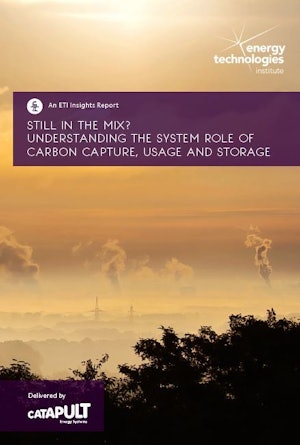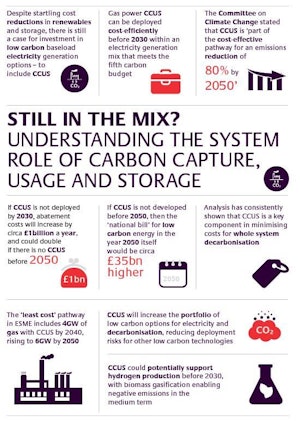Still in the Mix? Understanding the System Role of Carbon Capture, Usage and Storage

George Day
Head of Economic Strategy

Analysis by the Committee on Climate Change (CCC) and the Energy Technologies Institute (ETI) has for several years indicated that carbon capture, usage and storage (CCUS) is indispensable to a cost effective low carbon transition for the UK.
This report presents three new pieces of analysis that support the case for investing in up to 3GW of gas power CCUS before 2030, as part of a cost-effective pathway to 2050.
Firstly, updated whole energy system analysis shows how delaying commercial scale deployment of CCUS will increase the risks and probably increase the costs of energy sector transition.
Secondly, new electricity system analysis shows that we are still likely to need low carbon baseload generation to complement renewables. We should continue investing in options for low carbon baseload electricity generation, even though the costs of renewables and storage are falling fast. Both gas power with CCUS (‘gas power CCUS’) and new nuclear are worthy of comparable effort.
Electricity modelling shows that early gas power CCUS capacity (i.e. up to 3GW) is part of a cost-effective pre-2030 electricity generation mix that meets the fifth carbon budget. The modelling takes full account of cost reductions in renewables and the latest ETI evidence on the cost premium required for early gas power CCUS projects.
Thirdly, new analysis of the value for money of electricity technologies shows how gas power CCUS is cost effective because it delivers both low carbon electricity and capacity at peak. Current market arrangements do not fully reflect its system value. A ‘level playing field’ comparison significantly improves the competitive ranking of gas power CCUS compared to other low carbon options.

George Day
Head of Economic Strategy
George Day joined the ETI in November 2011 to lead work on the policy and economics of low carbon energy technologies. He has over 20 years of international experience as a policy economist in the water, energy and agricultural sectors. Before joining ETI he was a director at Ofwat the water sector regulator.